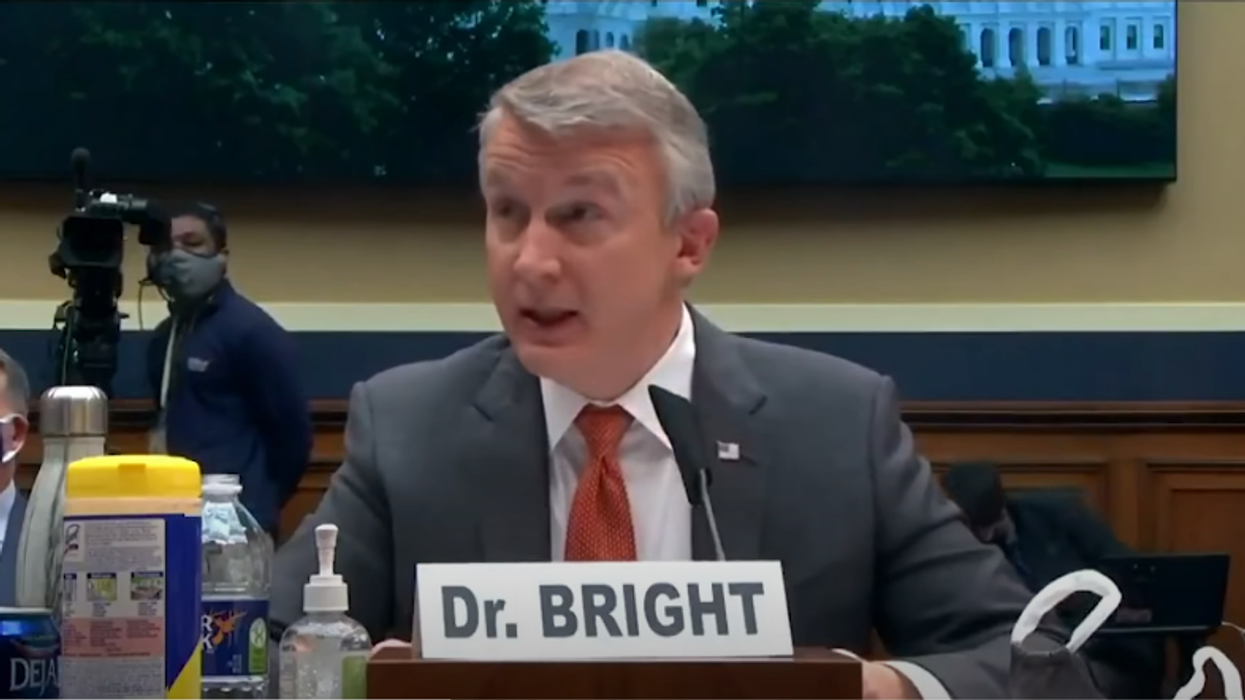Key Moments From The Coronavirus Whistleblower’s Testimony

Dr. Rick Bright
Reprinted with permission from Alternet
Watch Rick Bright's full opening statementwww.youtube.com
It was obvious that Rick Bright's Thursday testimony before the House Committee on Energy and Commerce was really getting to President Donald Trump when he denounced the former director of the Biomedical Advanced Research and Development Authority as a "disgruntled employee" — which is exactly the type of insult that Trump resorts to when someone gets under his skin (journalist Scott Martelle, in a Los Angeles Times op-ed, argued that Trump's insult only adds to Bright's credibility).
Bright, during his extensive testimony, had a lot to say about the coronavirus pandemic and Trump's response to it — explaining why he issued a whistleblower complaint. According to Bright's complaint, he was removed from his position at BARDA in April and reassigned to a different position in the National Institutes of Health because he didn't share Trump's enthusiasm for hydroxychloroquine as a possible COVID-19 treatment.
But when Bright testified for almost four hours, it was obvious that he had a lot more on his mind than hydroxychloroquine. Here are six key moments in Bright's testimony.
1. Bright warned that the United States could be facing its 'darkest winter in modern history'
The second wave of the Spanish flu pandemic of 1918/1919 turned out to be even deadlier than the first wave, and medical experts fear that COVID-19 could behave in a similar fashion — inflicting even more deaths in the fall and the winter in the U.S. than it has been inflicting in the spring. And Bright warned, "There will likely be a resurgence of COVID-19 this fall. It will be greatly compounded by the challenges of seasonal influenza. Without better planning, 2020 could be the darkest winter in modern history."
2. Bright stressed that COVID-19 testing has been painfully inadequate in the US
During his testimony, Bright not only emphasized that the U.S. hasn't been conducting nearly enough coronavirus testing — he also addressed the shortage of testing equipment. The former BARDA director told members of Congress that he was "quite alarmed" over a shortage of swabs needed for testing and "was even more surprised that the Strategic National Stockpile did not plan or have any of those in supply."
3. Bright complained that his warnings about medical supply shortages were repeatedly ignored
Trump has claimed that the coronavirus pandemic took the U.S. by surprise and that no one in the federal government could have predicted a crisis of that magnitude. But in fact, everyone from Peter Navarro (one of Trump's top economic advisers) to former Vice President Joe Biden was sounding the alarm back in January and February. So was Bright, who testified on Thursday that his warnings about the United States' lack of preparedness for COVID-19 were repeatedly ignored earlier this year.
Bright testified that on February 7, for example, he warned people at the Department of Health and Human Services about a shortage of N-95 masks — only to be told that such a shortage wasn't a problem. Bright recalled, "My response was, 'I cannot believe you can sit and say that with a straight face.' It was absurd."
4. Bright testified that a shortage of vital medical supplies resulted in needless deaths
Had the U.S. been better prepared in terms of N-95 masks and other supplies, Bright stressed, many lives would have been saved in the U.S. The former BARDA director explained, "Lives were endangered, and I believe lives were lost. Not only that — we were forced to procure the supplies from other countries without the right quality standards; so, even our doctors and nurses in the hospitals today are wearing N-95-marked masks from other countries that are not providing the sufficient protection that a U.S.-standard N-95 mask would provide them."
5. Bright cautioned that a COVID-19 vaccine might be far away and must be thoroughly tested for safety
Health experts have been reporting that a vaccine for COVID-19 might be one year away or more like 18 months away — which means that the U.S. might not be getting back to normal until well into 2021 or even 2022. And Bright, who described the Trump White House's vaccine timeline as an "aggressive schedule," cautioned that a vaccine will need to be thoroughly tested for safety.
Bright explained, "There's no one company that can produce enough for our country or for the world. We need to have a strategy and plan in place now to make sure that we can not only fill that vaccine, make it, distribute it, (but also), administer it in a fair and equitable plan…. We don't have that yet, and it is a significant concern."
Bright also emphasized that while a COVID-19 vaccine is being developed, the U.S. will need a comprehensive testing strategy and a lot of social distancing.
6. Bright advised that reopening the US economy must be done 'carefully' and not prematurely
Trump has been making it abundantly clear that he wants to see states reopening their businesses and schools sooner rather than later. But Bright told lawmakers that the U.S. will need to proceed with caution and that not doing so will be harmful from both a health standpoint and an economic standpoint.
Bright told members of Congress, "Americans yearn to get back to work, to open their businesses and to provide for their families. I get that. However, what we do must be done carefully, with guidance from the best scientific minds. Our window of opportunity is closing. If we fail to improve our response now, based on science, I fear the pandemic will get worse and be prolonged."
- 'Lives Were Lost': Dr. Bright Laments Trump's Inept Pandemic ... ›
- Bombshell Whistleblower Report Exposes Russia Coverup By Top DHS Officials - National Memo ›








